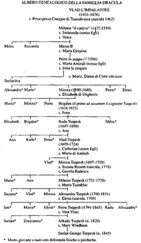1 ...6 7 8 10 11 12 ...28 Only three souls stood inside the vast chamber: the librarian and two young monks from the nearby monastery at Certosa. Unable to leave his domain unguarded, yet eager to retire now that the sun had set, the librarian scowled as I entered. I ignored him, knowing that I would be gone well before the monks, who stood with reverent awe in front of one of the manuscripts.
I passed them and headed for the library’s interior staircase, thinking to climb all the way to the fourth-floor perch, where I could stare far to the southern horizon toward Rome, looking for signs of my husband.
As I moved to the landing, movement outside the window caught my eye. On the banks of the moat near the castle’s main entry, two courtiers stood next to a servant who held the reins to two horses in one hand and a lamp in the other. In the faint arc of light, snowflakes sailed relentlessly downward.
I paused to stare at them. Though I could not make out their faces clearly, I recognized the build of one of them: Carlo Visconti, a black-haired courtier and member of Milan’s Council of Justice, his bearing and gestures betraying violent emotion. Beside him was an older, white-haired man who might have been his father.
Approaching them from the direction of the castle was a third man carrying a swooning young woman. At the sight, the older man beat his chest, then threw open his arms; gently, the third man handed her to her father.
Visconti was not so conciliatory; he drew his sword and lunged at the man who delivered the girl. The third man reacted by taking a great step backward, then spreading his arms in a gesture of peace.
For the space of several seconds, neither party moved; I supposed that one of them was speaking. Abruptly, Visconti sheathed his sword and sagged with grief. The man he had threatened stepped forward to put a hand upon Visconti’s shoulder, and in doing so, stepped into the lamplight.
I watched as Lorenzo the Magnificent kept his hand upon the courtier’s shoulder, then put another on the father’s, and spoke for a moment. Afterward, he dug into a pocket and discreetly handed Visconti a purse. The latter pocketed it without argument.
The snow grew heavier, prompting the father to mount one of the horses. He reached for his daughter, who was unsteady on her legs; it took both Visconti and Lorenzo to get her up into the saddle. Visconti and the servant then mounted the remaining horse; Visconti paused long enough to bow from the shoulders to Lorenzo, who returned the gesture before the trio galloped off across the drawbridge.
I remained at the window as Lorenzo turned, the wind whipping his dark hair across his face, and watched as he made his way grimly back to the castle. At its entrance he paused to glance pointedly up at the library window—at me, as if, impossibly given his poor eyesight, he saw me standing there.
Chapter Two
Snow fell that night. By morning, the clouds had gone, leaving behind a blue sky and an infinite white expanse that glittered beneath the sun. The weather was still bitter, but the wind had died; a good day for travel, Bona told me brightly, and promised that Matteo would be home within two days.
I smiled faintly at her cheer, though my anxiety had not eased; I woke with a gut so clenched I could not face breakfast. Instead I prayed earnestly beside Bona in the chapel: Lord, guard Your servant Matteo da Prato and bring him safely home to me. Blessed Virgin, Mother of God, keep my husband from harm. Saint Christopher, patron of travelers, protect him . . .
Afterward, I put on my heavy cloak and went downstairs to the passage that led to the garden, where the woodsmen had piled boughs of evergreen as high as my shoulders. I gathered several boughs into my arms, and made my way carefully over the slippery floor of the open loggia; on the opposite side, an old serving woman swept away the snow with a broom while her frailer husband followed, sprinkling ash from a pail onto the stone.
Matteo’s chamber, situated on the first level, directly beneath the duke’s bedroom, stood two doors from the garden passage. Only the highest of Galeazzo’s officials were housed on the second floor along with the ducal family; Galeazzo’s secretary and right-hand man, Cicco Simonetta, was privileged to live right next to the duke’s suite, closer even than Bona. In recognition of Matteo’s intelligence and loyalty, however, he had been rewarded with one of the better downstairs chambers.
I paused at the entrance to my husband’s room, wrestling with my fragrant burden in order to get the key from my cloak pocket. Like his immediate superior, Cicco, Matteo always kept his chamber locked; the duke entrusted all his state secrets to Cicco, who in turn shared a few of them with my husband. In these perilous times, a prince was wise to encrypt any correspondence he did not want read by anyone other than the intended recipient; couriers could not always be trusted. The duke had promoted Cicco to a position of great power because of the latter’s natural grasp of the art of encryption, and Cicco had promoted my husband because of Matteo’s ability to create and memorize hard-to-break ciphers. Matteo could look at a letter in Latin or the vernacular and encrypt it in a matter of minutes, an unheard-of feat. After seven years of acquainting himself diligently with the duke’s most confidential matters, Matteo was chosen to serve as a junior envoy to Rome. He had visited there once in the spring, before we were married, and was soon to return from his second visit. I asked him no questions, but I was proud: I had no doubt that he dealt with members of the Sacred College, perhaps even with the pope himself.
The melting snow had caused the wooden door to swell; even unlocked, it would not open until I gave it a hard kick. Once it was open, I set down a branch and wiped my feet upon it, then closed the door behind me and scattered the rest of the perfumed boughs onto the stone floor.
Matteo had been gone almost two months, but the room still smelled of him, of rosemary water and olive oil soap, of parchment and iron-gall ink, of the indescribable scent of male flesh. The room was chilly, the hearth long-unlit; I had told God that morning that I would set my oddly persistent fear for Matteo’s safety aside and trust that my prayers on his behalf would be answered. As proof of my conviction, I would perform an act of faith and light the fire, so that the room would be cozy by the time my husband arrived.
Yesterday, I had loaded wood onto the grate, with strategically placed juniper bark as tinder; today, I took the tinderbox from the mantel and retrieved the flint and steel. It took several tries before a spark fell and caught; I sat on my heels and fanned it, thinking of my strange marriage.
Other women would think me exceedingly lucky. Though lacking noble blood and the convenience of well-placed family, Matteo had succeeded in using his wits to rise to an admirable station. And he was good-looking enough—taller than most of the other men, and long-limbed, if a bit too slender, with straight, thick auburn hair so dark it looked black after sunset. He kept it cut short and often hidden beneath a red felt cap, of the same close-fitting sort his master Cicco wore. His skin was naturally pale, though it had browned during his travels; his eyes were a clear, light hazel, thoughtful and calm. His lips were full and pretty, though the bow of his upper lip bore a scar from a childhood mishap. His words were spoken softly and always kind. Occasionally, when he was tired or forgot himself, his Tuscan accent became noticeable.
Over the seven years he had spent at Duke Galeazzo’s court, Matteo was never far from me. On holidays, at picnics, at summer games in the courtyard, or at the hunt, Matteo always managed to seek out my company; he seemed to know a good deal about the particular circumstances of my life, and was always interested in how I was faring, especially in my studies. He wanted to know whether Bona was good to me, or Caterina rude, what my favorite subjects and hobbies were, what books I had read. I responded with questions of my own, and learned that he was from Florence—or rather, from the Ospedale degli Innocenti, the city’s largest orphanage.
Читать дальше












